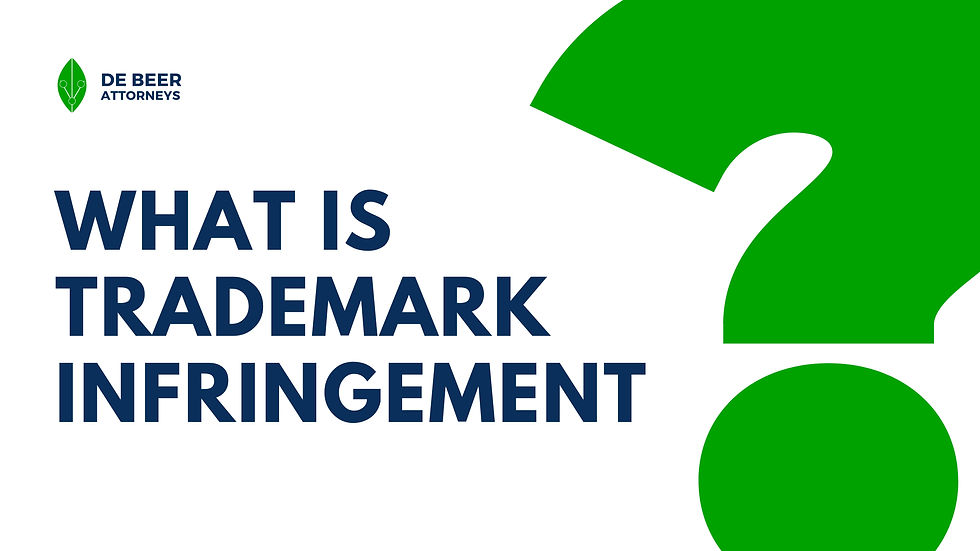
Are you wondering what constitutes trademark infringement? We can help. Trademark infringement comes about when someone uses a trademark that is either identical or very similar to a registered trademark without the trademark owner’s permission. This kind of misuse can confuse customers, making them believe that the goods or services are connected to the trademark owner when they’re not. In South Africa, the Trade Marks Act 194 of 1993 governs trademark rights and protects owners of registered trademarks.
What Is Considered Trademark Infringement?
The South African Trade Marks Act outlines several situations where infringement can occur:
Using an Identical Mark: If someone uses a mark that is exactly the same as a registered trademark for the same types of goods or services, it is clear trademark infringement.
Using a Similar Mark that Causes Confusion: If a mark isn’t exactly the same but is close enough to the registered trademark that it might confuse the public into thinking the two are related, this also qualifies as infringement.
Use of a Similar Mark on Unrelated Goods or Services: Even if the goods or services are different from those covered by the trademark, using a similar mark may still count as infringement if it damages or dilutes the reputation of a well-known brand.
Exceptions (Defenses) to Trademark Infringement
Not every use of a similar mark counts as infringement. There are some defences and exceptions provided under South African law:
Descriptive Use: If the mark is used simply to describe characteristics of the product (such as "Quality Chocolates"), it may not count as infringement, as long as it’s not misleading.
Comparative Advertising: South African law allows businesses to refer to other brands in comparative advertising, provided it is done fairly and truthfully.
Prior Use: If a person was using the trademark or a similar mark before the current owner registered it, this might be a valid defence to avoid liability for infringement.
Legal Actions Available to Trademark Owners
If your trademark is infringed, there are several legal remedies available to you under the Trade Marks Act.
These include:
Interdict (Injunction): A court can issue an interdict, ordering the infringing party to stop using the mark immediately.
Damages: You may claim compensation for any financial loss you suffered as a result of the infringement.
Delivery of Infringing Goods: The court may also order the delivery or destruction of infringing goods, ensuring that they are removed from the market.
How to Protect Your Trademark from Infringement
To safeguard your trademark and prevent others from infringing on it, consider taking these steps:
Register Your Trademark: Trademark registration is the strongest protection you can have. It gives you exclusive rights to use your trademark in connection with the goods or services you’ve registered, within South Africa or other countries where you choose to register.
Regularly Monitor the Market: Keep an eye on how your brand is being used. Regular monitoring can help you catch unauthorised use early before it becomes a bigger problem.
Act Quickly: If you discover infringement, it’s important to act quickly. Contact the party using your mark, or consult with a trademark lawyer to take further action before your brand suffers any more damage.
The Consequences of Trademark Infringement
The impact of trademark infringement can be serious, both for the infringer and the trademark owner:
For the Trademark Owner: Infringement can damage your brand’s reputation, confuse your customers, and result in financial loss. However, acting swiftly to enforce your rights can help reduce harm.
For the Infringer: The consequences of infringement can include court orders (interdicts) to stop using the trademark, financial damages, and having infringing goods removed from sale. Infringers may also suffer reputational damage that can affect customer trust.
Tips to Avoid Trademark Infringement
Avoiding engaging in trademark infringement is crucial for protecting your brand and ensuring compliance with trademark legislation. Follow these steps to minimise the risk of infringing on another party's trademark:
Conduct a Thorough Trademark Search: Make the investment to perform a trademark search which will help you discover similar trademarks that are in use or already registered.
Secure Licensing Agreements: If using someone else’s trademark, always obtain proper licensing permissions to avoid running into any legal issues.
Create Distinctive Trademarks: Ensure your desired brand name, logo, or slogan is unique and not already registered or in use by another entity with the same or a similar version of your brand assets.
Regularly Monitor Trademark Use: Keep track of your brand’s usage to avoid accidental infringement.
Seek Legal Advice: If you’re unsure about any aspect of your trademark use, consult with an IP attorney who specialises in trademark law to effectively safeguard your brand against infringement claims.
How De Beer Attorneys Can Help You Fight Against Trademark Infringement
If you believe your trademark has been infringed or if someone is wrongfully accusing you of infringing on their trademark rights, De Beer Attorneys can help you. We offer a full range of services from trademark registration to trademark enforcement or litigation assistance that will help you protect your brand’s visual and reputational value. Start the conversation today by sending our award-winning team an email at info@debeerattorneys.com.
This information was last updated on 8 September 2024. This information is for general educational and entertainment purposes and is subject to change at any time.

Comments